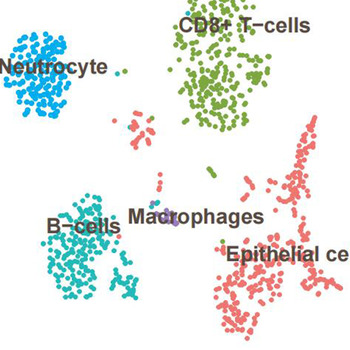Complement C1QC as a potential prognostic marker and therapeutic target in colon carcinoma based on single-cell RNA sequencing and immunohistochemical analysis
DOI:
https://doi.org/10.17305/bjbms.2022.7309Keywords:
Colon carcinoma, C1QC, prognostic marker, single-cell RNA sequencingAbstract
Immune cell infiltration plays an essential role in the occurrence and development of colon cancer. However, the main tumor-associated immune cell infiltration and its gene regulation in colon cancer still need to be further clarified in order to provide a new perspective for diagnosing and treating this disease. For this study, single-cell RNA sequencing (scRNA-seq) expression profiles and TCGA colon cancer data sets were first acquired from the GEO database. Then, Seurat, Monocle, LIMMA, Clusterprofile, GSVA and GSEABase algorithms were used to systematically examine the data. Potential target drugs corresponding to target genes were analyzed in the Drugbank database and detected by molecular docking. Immunohistochemistry was used to assess the level of C1QC expression in the tissue microarray. Single cell analysis suggested that neutrophil activation might be the critical regulatory pathway in colon cancer and that macrophages were the main cell population involved. Subsequent functional enrichment analysis on differential genes in macrophages suggested that C1QC may be a critical regulatory factor in the occurrence and progression of colon cancer, and was closely related to the survival of patients. According to the drug target prediction, palivizumab is a targeted drug for C1QC, and molecular docking demonstrated that palivizumab binds to C1QC. Additionally, tissue-microarray based immunohistochemical analysis showed that C1QC was highly expressed in colon cancer tissue, and the prognosis of colon cancer patients with high C1QC expression was worse, closely related to age, lymphatic metastasis and the TNM stage (Tumor, Nodes and Metastases). Our findings suggest that C1QC may regulate the macrophages in colon cancer immune infiltration, which is expected to be a potential immunotherapy target for colon cancer, and beneficial for the diagnosis and prognosis of colon cancer patients.
Citations
Downloads

Downloads
Additional Files
Published
License
Copyright (c) 2022 Huiming Deng, Yan Chen, Yong Liu, Li Liu, Ronghua Xu

This work is licensed under a Creative Commons Attribution 4.0 International License.
How to Cite
Accepted 2022-06-15
Published 2022-10-23









